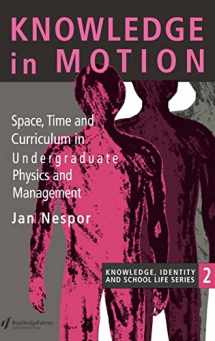
Knowledge In Motion: Space, Time And Curriculum In Undergraduate Physics And Management (Knowledge, the Identity and School Life, Vol 2)
ISBN-13:
9780750702706
ISBN-10:
0750702702
Edition:
1
Author:
Jan Nespor
Publication date:
1994
Publisher:
Routledge
Format:
Hardcover
166 pages
FREE US shipping
on ALL non-marketplace orders
Marketplace
from $211.93
USD
Marketplace offers
Seller
Condition
Note
Seller
Condition
Used - Like New
Book details
ISBN-13:
9780750702706
ISBN-10:
0750702702
Edition:
1
Author:
Jan Nespor
Publication date:
1994
Publisher:
Routledge
Format:
Hardcover
166 pages
Summary
Knowledge In Motion: Space, Time And Curriculum In Undergraduate Physics And Management (Knowledge, the Identity and School Life, Vol 2) (ISBN-13: 9780750702706 and ISBN-10: 0750702702), written by authors
Jan Nespor, was published by Routledge in 1994.
With an overall rating of 4.4 stars, it's a notable title among other
books. You can easily purchase or rent Knowledge In Motion: Space, Time And Curriculum In Undergraduate Physics And Management (Knowledge, the Identity and School Life, Vol 2) (Hardcover) from BooksRun,
along with many other new and used
books
and textbooks.
And, if you're looking to sell your copy, our current buyback offer is $0.3.
Description
Using an analysis of learning by a case study comparison of two undergraduate courses at a United States University, Nespor examines the way in which education and power merge in physics and management. Through this study of politics and practices of knowledge, he explains how students, once accepted on these courses, are facilitated on a path to power; physics and management being core disciplines in modern society. Taking strands from constructivist psychology, post-modern geography, actor-network theory and feminist sociology, this book develops a theoretical language for analysing the production and use of knowledge. He puts forward the idea that learning, usually viewed as a process of individual minds and groups in face-to-face interaction, is actually a process of activities organised across space and time and how organisations of space and time are produced in social practice.; Within this context educational courses are viewed as networks of a larger whole, and individual courses are points in the network which link a wider relationship by way of texts, tasks and social practices intersecting with them. The book shows how students enrolled on such courses automatically become part of a network of power and knowledge.


We would LOVE it if you could help us and other readers by reviewing the book
Book review

Congratulations! We have received your book review.
{user}
{createdAt}
by {truncated_author}


